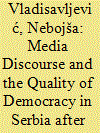| Srl | Item |
| 1 |
ID:
175639


|
|
|
|
|
| Summary/Abstract |
This article addresses the puzzle of electoral engineering in autocracies using data from three rounds of Russian regional legislative elections between 2003 and 2017. The analysis shows that electoral engineering was widespread in regions where governors lacked the resources necessary to rely on blatant forms of electoral malpractice for the benefit of United Russia. This pattern became evident during the third round of regional legislative elections. The study indicates that the manipulation of electoral systems may be important for authoritarian rulers when they are unable to rely on blatant electoral malpractice to ensure the certainty of electoral outcomes.
|
|
|
|
|
|
|
|
|
|
|
|
|
|
|
|
| 2 |
ID:
175637


|
|
|
|
|
| Summary/Abstract |
The subject of this analysis is a situation observed in Poland and, in recent years, other countries of Central and Eastern Europe, in which the leadership of the executive is located outside a constitutionally defined government. A representative situation in which a prime minister is controlled by a party leader without a formal government position is defined as a ‘surrogate government’. Five Polish cabinets in the period 1991–2019 met the preliminary criteria of ‘surrogate government’; of these, the cabinets of Beata Szydło and Mateusz Morawiecki come closest to fulfilling the criteria completely.
|
|
|
|
|
|
|
|
|
|
|
|
|
|
|
|
| 3 |
ID:
175636


|
|
|
|
|
| Summary/Abstract |
The article examines the quality of democracy in Serbia via the quantitative analysis of media discourse. It reveals robust competition, participation and accountability in the first decade after regime change, followed by major recent decline, thus showing that expert assessments from influential indices of democracy underrated democratic quality in the former period and overrated it later. Also revealed are the advantages of complementing expert assessments with those based on media discourse. The content analysis examined 1,921 coded items from print and electronic media coverage of major political conflicts at strategic points in the country’s democratisation.
|
|
|
|
|
|
|
|
|
|
|
|
|
|
|
|
| 4 |
ID:
175641


|
|
|
|
|
| Summary/Abstract |
After the deluge of archival declassification that took place following the collapse of the Soviet Union, historians of Soviet society, and of the political police in particular, are still denied access to the FSB archives in Russia. However, a combination of political turmoil and military conflict has led to the opening of the entire archives of other Soviet-era political police services. This article will discuss why research into the Soviet political police remains critically important, examine the opening of the archives in Georgia and Ukraine, and explain what these archives contain and how to use them. Finally, possibilities for new areas of research are explored.
|
|
|
|
|
|
|
|
|
|
|
|
|
|
|
|
| 5 |
ID:
175640


|
|
|
|
|
| Summary/Abstract |
Resource management is essential for any organisation’s success. For non-profit organisations (NPOs) volunteers are a key resource. In this article, we examine how NPOs recruit, mobilise and manage volunteers in a challenging institutional and operational context. By drawing on a qualitative study of Russian health NPOs, our study highlights that the operational and institutional environment encountered by Russian NPOs leads to ‘management by network’ to acquire necessary volunteer resources. This pragmatic approach, whilst ensuring an organisation’s short-term survival, ultimately limits the type of volunteer recruited by Russian NPOs. The implications of these findings are also explored.
|
|
|
|
|
|
|
|
|
|
|
|
|
|
|
|
| 6 |
ID:
175638


|
|
|
|
|
| Summary/Abstract |
Post-1991 attempts to integrate the Russian-speaking population in Estonia failed to address a significant identity aspect: their collective memory. The application of the mnemonic actor concept to ordinary individuals, rather than political elites, demonstrates the diverse constructions of collective memory narratives. Three prevailing types of narratives were identified through interviews, suggesting the heterogeneity of the local Russophone identity. All the narratives are attributed to the 9 May commemoration of the Soviet victory over Nazi Germany in 1945, but vary significantly in their temporal boundaries as well as in identity group inclusiveness. The latter is reflected in the respondents’ opposition to certain out-groups, especially Estonians or Russians in Russia.
|
|
|
|
|
|
|
|
|
|
|
|
|
|
|
|
| 7 |
ID:
175635


|
|
|
|
|
| Summary/Abstract |
Terry Cox has contributed to the subject area covered by Europe-Asia Studies in multiple ways over a long and varied career. He came to the then Institute of Soviet Studies of Glasgow University in 1969 as a research student, having completed a degree at Durham University in Sociology and Politics. He brought with him interests in rural sociology, Soviet history and political sociology and was looking for a PhD topic related to peasant political consciousness. Alec Nove, the then institute director, suggested a study of the so-called Agrarian Marxists who had been active in developing research on the peasantry in the Soviet Union in the 1920s. The PhD was supervised by Alec jointly with Hillel Ticktin. While pursuing his PhD research, Terry was also awarded a visiting fellowship at the University of Giessen to produce a study of the newly emerging rural sociology in the Soviet Union of the 1960s and 1970s which resulted in his first book (1979a).
|
|
|
|
|
|
|
|
|
|
|
|
|
|
|
|